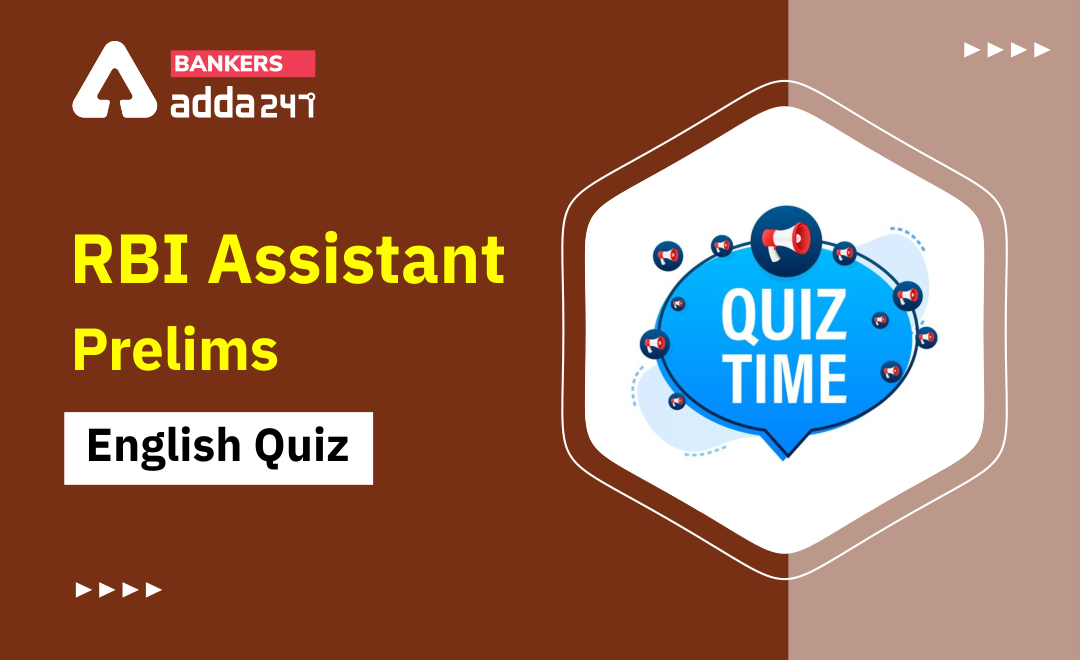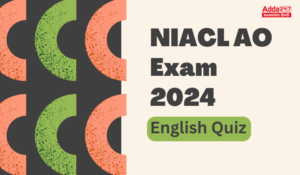
Directions (1-5): Read each sentence to find out whether there is any grammatical or idiomatic error in it. The error, if any, will be in one part of the sentence. The number of that part is the answer. If there is ‘No error’, the answer is (e). (Ignore errors of punctuation, if any.)
Q1. MakeMyTrip has announced (A)/ free homestays to 1,000 (B)/ consumers on a first (C)/ come first serve base. (D)/ No error (E)
(a) A
(b) B
(c) C
(d) D
(e) E
Q2. The maximum temperature in Delhi (A)/ on Sunday was recorded at 38.3 degrees Celsius, (B)/ which is eight degrees above the normal for (C)/ this time of the year at the Safdarjung weather observatory. (D)/ No error (E)
(a) A
(b) B
(c) C
(d) D
(e) E
Q3. The Women and Children Safety Wing (A)/ of Cyberabad in Hyderabad took to Twitter (B)/ to share a post about domestic (C)/ violence and urge people to speak about it. (D)/ No error (E)
(a) D
(b) C
(c) B
(d) A
(e) E
Q4. President Ram Nath Kovind inaugurated (A)/ a Mughal-era inspired heritage park near (B)/ Jama Masjid in Delhi on Sunday named on Charti Lal Goel, (C)/ the first speaker of the Delhi Legislative Assembly. (D)/ No error (E)
(a) B
(b) A
(c) C
(d) E
(e) D
Q5. PayPal said it is expending services (A)/ in Ukraine and Ukrainians will now (B)/ be able to send and receive (C)/ money from friends and family. (D)/ No error (E)
(a) A
(b) B
(c) C
(d) D
(e) E
Directions (6-10): Certain words are highlighted in the following sentences. It is possible that one of them has incorrect spelling. Select the word which has been incorrectly spelled. If all of them are correct, choose (e) All are correct.
Q6. Castor oil is a viscid liquid, almost colourless when pure, possessing only a slight odour, and a mild yet highly nauscous and disagreeable taste.
(a) viscid
(b) possessing
(c) odour
(d) nauscous
(e) All are correct
Q7. Egyptian archeologists started excavating the site in September and found the tombs of senior officials, including regional rulers and palace supervisors in ancient Egypt.
(a) archeologists
(b) excavating
(c) tombs
(d) supervisors
(e) All are correct
Q8. Astronomars have now spotted a giant debris cloud made from the collision of two celestial objects in deep space that could provide insights into planetary formation.
(a) Astronomars
(b) celestial
(c) insights
(d) planetary
(e) All are correct
Q9. This technique is applicable to a wide variety of crops, but some modifications may be necessary to acommodate the peculiarities of each type.
(a) peculiarities
(b) acommodate
(c) modifications
(d) applicable
(e) All are correct
Q10. Despite amassing an invasion force of nearly 200,000 troops and thousands of armored vehicles supported by combat aircraft and warships, the Russian military has failed to reach its primary objectives in the three weeks since its offensive into Ukraine began.
(a) amassing
(b) armored
(c) combat
(d) offensive
(e) All are correct
Directions (11-15): Rearrange the given sentence (A), (B), (C), (D), (E) and (F) to form a meaningful paragraph and answer the questions that follow.
(A) The term ‘Mandela effect’ was first coined in 2009 by Fiona Broome when she created a website to detail her observance of the phenomenon.
(B) The Mandela effect refers to a situation in which a large mass of people believes that an event occurred when it did not.
(C) Factors that can influence memory include misinformation and misattribution of the original source of the information.
(D) She built this website to describe her memories of former South African President Nelson Mandela dying in jail in the 1980s.
(E) Nelson Mandela, on the other hand, did not die in jail in the 1980s; he spent 27 years in prison and then served as President of South Africa from 1994 to 1999, before dying in 2013.
(F) It describes a situation in which a person or a group of people have a false memory of an event.
Q11. Which of the following will be the LAST sentence of the rearranged paragraph?
(a) A
(b) C
(c) E
(d) D
(e) F
Q12. Which of the following will be the FIFTH sentence of the rearranged paragraph?
(a) A
(b) D
(c) E
(d) B
(e) F
Q13. Which of the following will be the THIRD sentence of the rearranged paragraph?
(a) F
(b) D
(c) E
(d) C
(e) A
Q14. Which of the following will be the FIRST sentence of the rearranged paragraph?
(a) A
(b) C
(c) E
(d) D
(e) B
Q15. What will be the correct sequence of the given sentences?
(a) BFCADE
(b) BEDACF
(c) FBADEC
(d) AFDEBC
(e) ABDECF
Solutions:
S1. Ans (d)
Sol. The error lies in the part D of the sentence.
The correct phrase to be used is first come first serve basis.
First come first serve basis used to say that the people who arrive earliest get served or treated before the people who arrive later.
S2. Ans (e)
Sol. There is no grammatical or contextual error in the given sentence.
S3. Ans (a)
Sol. The error lies in the part D of the sentence.
Urged will take the place of urge because the event in the sentence has already happened (past tense).
S4. Ans (c)
Sol. The error lies in the part C of the sentence.
Named after should be used here.
S5. Ans (a)
Sol. The error lies in the part A of the sentence.
Expanding (to increase in extent, size, volume, scope, etc. / to spread or stretch out; unfold) is the correct word to be used instead of expending [spend or use up (a resource such as money or energy].
S6. Ans (d)
Sol. The word with incorrect spelling is: nauscous.
The correct spelling: Nauseous.
S7. Ans (a)
Sol. The word with incorrect spelling is: archeologists.
The correct spelling: archaeologists.
S8. Ans (a)
Sol. The word with incorrect spelling is: Astronomars.
The correct spelling: Astronomers.
S9. Ans (b)
Sol. The word with incorrect spelling is: accommodate.
The correct spelling: accommodate.
S10. Ans (b)
Sol. The word with incorrect spelling is: armored.
The correct spelling: armoured.
S11. Ans. (c)
Sol. The correct sequence is BFCADE.
(B) The Mandela effect refers to a situation in which a large mass of people believes that an event occurred when it did not.
(F) It describes a situation in which a person or a group of people have a false memory of an event.
(C) Factors that can influence memory include misinformation and misattribution of the original source of the information.
(A) The term ‘Mandela effect’ was first coined in 2009 by Fiona Broome when she created a website to detail her observance of the phenomenon.
(D) She built this website to describe her memories of former South African President Nelson Mandela dying in jail in the 1980s.
(E) Nelson Mandela, on the other hand, did not die in jail in the 1980s; he spent 27 years in prison and then served as President of South Africa from 1994 to 1999, before dying in 2013.
S12. Ans. (b)
Sol. The correct sequence is BFCADE.
(B) The Mandela effect refers to a situation in which a large mass of people believes that an event occurred when it did not.
(F) It describes a situation in which a person or a group of people have a false memory of an event.
(C) Factors that can influence memory include misinformation and misattribution of the original source of the information.
(A) The term ‘Mandela effect’ was first coined in 2009 by Fiona Broome when she created a website to detail her observance of the phenomenon.
(D) She built this website to describe her memories of former South African President Nelson Mandela dying in jail in the 1980s.
(E) Nelson Mandela, on the other hand, did not die in jail in the 1980s; he spent 27 years in prison and then served as President of South Africa from 1994 to 1999, before dying in 2013.
S13. Ans. (d)
Sol. The correct sequence is BFCADE.
(B) The Mandela effect refers to a situation in which a large mass of people believes that an event occurred when it did not.
(F) It describes a situation in which a person or a group of people have a false memory of an event.
(C) Factors that can influence memory include misinformation and misattribution of the original source of the information.
(A) The term ‘Mandela effect’ was first coined in 2009 by Fiona Broome when she created a website to detail her observance of the phenomenon.
(D) She built this website to describe her memories of former South African President Nelson Mandela dying in jail in the 1980s.
(E) Nelson Mandela, on the other hand, did not die in jail in the 1980s; he spent 27 years in prison and then served as President of South Africa from 1994 to 1999, before dying in 2013.
S14. Ans. (e)
Sol. The correct sequence is BFCADE.
(B) The Mandela effect refers to a situation in which a large mass of people believes that an event occurred when it did not.
(F) It describes a situation in which a person or a group of people have a false memory of an event.
(C) Factors that can influence memory include misinformation and misattribution of the original source of the information.
(A) The term ‘Mandela effect’ was first coined in 2009 by Fiona Broome when she created a website to detail her observance of the phenomenon.
(D) She built this website to describe her memories of former South African President Nelson Mandela dying in jail in the 1980s.
(E) Nelson Mandela, on the other hand, did not die in jail in the 1980s; he spent 27 years in prison and then served as President of South Africa from 1994 to 1999, before dying in 2013.
S15. Ans. (a)
Sol. The correct sequence is BFCADE.
(B) The Mandela effect refers to a situation in which a large mass of people believes that an event occurred when it did not.
(F) It describes a situation in which a person or a group of people have a false memory of an event.
(C) Factors that can influence memory include misinformation and misattribution of the original source of the information.
(A) The term ‘Mandela effect’ was first coined in 2009 by Fiona Broome when she created a website to detail her observance of the phenomenon.
(D) She built this website to describe her memories of former South African President Nelson Mandela dying in jail in the 1980s.
(E) Nelson Mandela, on the other hand, did not die in jail in the 1980s; he spent 27 years in prison and then served as President of South Africa from 1994 to 1999, before dying in 2013.




 English Quiz For NIACL AO Mains 2024 Exa...
English Quiz For NIACL AO Mains 2024 Exa...

